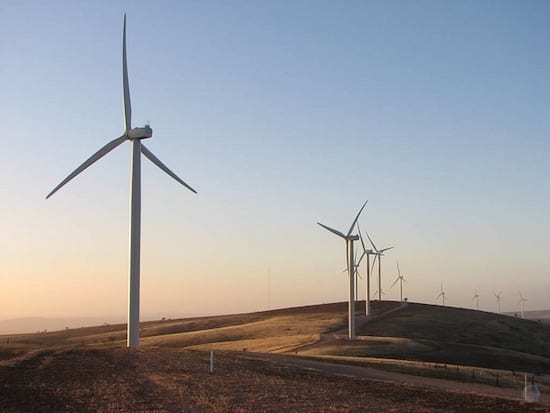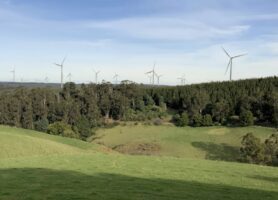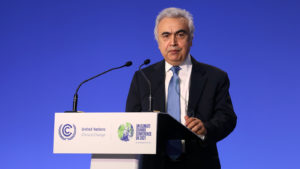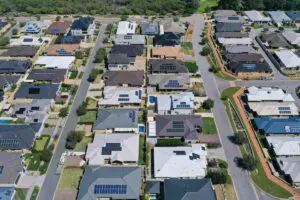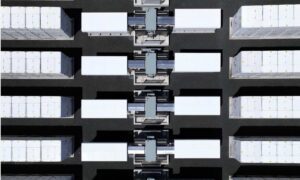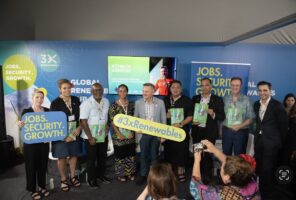Listed renewable energy company Tilt Renewables has secured the sale of the 270MW Snowtown 2 wind farm in South Australia for the surprisingly high price of $1.07 billion in the biggest single transaction of its type in the country.
The sale to Palisade Investment Partners Limited and First State Super follows the start of a “strategic” review launched in June by Tilt which was looking to free up capital for a raft of new investment opportunities in Australia for wind, solar and battery storage projects.
The deal will see the sale of shares in the Snowtown 2 project worth $472 million, with another $611 million coming in the form of debt that was recently re-financed by Tilt, which also freed up some $86 million in capital thanks to the more generous terms. A sale price of around $800 million had been anticipated.
Snowtown 2 was commissioned in 2014 and has a long term power purchase contract with Origin Energy until 2030, with a five year option after that. There is a potential for a solar farm to be added as well.
It is the fourth largest wind farm in the country and this deal is the largest single transaction in the country – although the 420MW Macarthur wind farm has also recently changed hands, albeit in 50 per cent tranches.
Tilt will retain ownership of the neighbouring 100MW Snowtown 1 wind farm, which operates on a merchant basis and where it is also looking to add some 21MW/42MWh of battery storage, with a final decision expected in the next few months.
“We’re still hoping to put a battery in,” Tilt CEO Deion Campbell told RenewEconomy, adding that talks are continuing with the Australian Energy Market Operator over issues such as the existing generator performance standard.
But Snowtown – now with an extra $455 million freed up from this latest transaction – also has a raft of other development projects in the pipeline, including the 1GW Liverpool Range wind project in NSW, and the 300MW Rye Park wind project, also in NSW.
Other projects in the pipeline include the Waddi (140MW) wind and solar project in Western Australia, the Western Downs (250MW), Chewko (80MW) and Dysart (120MW) solar projects in Queensland, and the North Creek (330MW) wind project in Queensland.
It is also building the 330MW Dundonnell wind farm in Victoria, which it expects to complete by the end of 2020. Campbell said future projects would likely depend on a mix of state-based targets and corporate demand.
But Campbell told RenewEconomy the regulatory environment in Australia “was very difficult” which was one reason why the company continued to pursue projects in New Zealand. Campbell also cited it as one of the reasons why it abandoned a pumped hydro proposal in South Australia.
ITK analyst David Leitch said the Snowtown transaction was a good price that reflected the “locked in” revenue from the long term off-take agreement with Origin Energy. “As interest rates have fallen that revenue stream is more valuable,” he said. This also underpinned the recent good price for the Macarthur wind farm.
“The sale of Snowtown 2 is consistent with Tilt Renewables’ focus on delivering shareholder value from market opportunities and ensuring capital is available to execute near‐term, high‐value opportunities from its development pipeline,” Deion Campbell said in an earlier statement.
“It is pleasing to see the market acknowledge the quality of this asset, which is representative of the quality of the rest our operational and development portfolio and the value our highly experienced team can create for shareholders over time.
In a ‘P50’ or average wind year, Snowtown 2 wind farm contributed approximately $A68 million of EBITDAF (earnings before interest tax and depreciation) per annum to Tilt, the company said.
Snowtown is also the subject of a legal suit brought by the Australian Energy Regulator against Tilt and three other wind farm operators over events leading to the state-wide blackout in South Australia in September, 2016. That case is expected to be heard next year.
Palisade owns and manages a range of renewable energy assets in Australia including the Waterloo Wind Farm, Hallett Wind Farm, Granville Harbour Wind Farm and Ross River Solar Farm.
First State Super, one of Australia’s largest profit‐for‐member superannuation funds, investing more than A$100 billion on behalf of more than 800,000 members, owns many major infrastructure assets and this is its first direct investment in renewable energy in Australia.
regulatory space too hard. pumped hydro Highbury.

